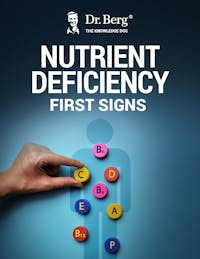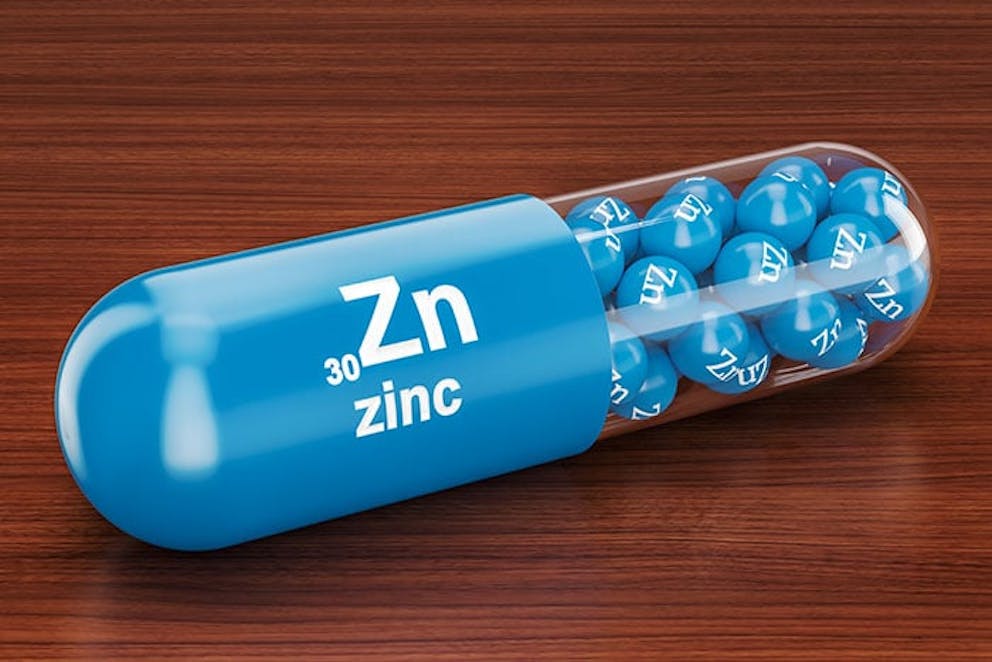Too Much Zinc Causes a Copper Deficiency

The First Signs of a Nutrient Deficiency
Learn how to recognize early symptoms related to specific nutrient deficiencies
Receive a downloadable list of early indicators your body is lacking key nutrients

The First Signs of a Nutrient Deficiency
Learn how to recognize early symptoms related to specific nutrient deficiencies
Receive a downloadable list of early indicators your body is lacking key nutrients

The First Signs of a Nutrient Deficiency
Learn how to recognize early symptoms related to specific nutrient deficiencies
Receive a downloadable list of early indicators your body is lacking key nutrients

The First Signs of a Nutrient Deficiency
Learn how to recognize early symptoms related to specific nutrient deficiencies
Receive a downloadable list of early indicators your body is lacking key nutrients

The First Signs of a Nutrient Deficiency
Learn how to recognize early symptoms related to specific nutrient deficiencies
Receive a downloadable list of early indicators your body is lacking key nutrients

The First Signs of a Nutrient Deficiency
Learn how to recognize early symptoms related to specific nutrient deficiencies
Receive a downloadable list of early indicators your body is lacking key nutrients
Understanding the effects of zinc overconsumption is crucial for maintaining optimal health. While zinc is vital in numerous bodily functions, excessive intake can lead to adverse health effects, particularly an imbalance with other essential minerals such as copper.
Learn about the intricate relationship between zinc and copper, shedding light on how excess zinc intake can disrupt this balance.
Identify symptoms of copper deficiency - a common consequence of prolonged exposure to high zinc levels.
Understanding the Relationship Between Zinc and Copper
Zinc and copper play vital roles as partners, each contributing to various physiological functions. However, maintaining a delicate balance between these two essential minerals is crucial for optimal well-being.
The Role of Zinc and Copper in human health
Zinc helps with DNA synthesis, wound healing, and even growth during pregnancy and childhood. Meanwhile, copper is the red blood cell champion and supports healthy brain development. They both have important jobs.
Overconsumption of zinc can disrupt the equilibrium between copper and zinc, leading to adverse effects. This imbalance can be caused by overconsumption of zinc-rich foods or supplementation, leading to chronic toxicity.
How an imbalance occurs with excessive intake of zinc
When you go overboard with zinc supplementation or chow down on zinc-rich foods like oysters and beef, you might experience chronic zinc toxicity. This can cause a copper deficiency, which is not what you want.
So, be careful with those zinc supplements. Taking too much can lead to short-term side effects like nausea and vomiting (aka metal fume fever) and more serious long-term effects. It can mess with your hemoglobin production and leave you feeling tired.
Be cautious and consult a physician before adding any supplements to your dietary routine.

Identifying Symptoms of Copper Deficiency
When you take too much zinc, your body may not be able to absorb enough copper. And that's when symptoms of copper deficiency begin appearing. Pay attention to the sneaky health issues that often get mistaken for something else.
Nausea: A Not-So-Fun Side Effect
Are you feeling queasy? It could indicate a mineral imbalance caused by too much zinc. Consider having your levels tested if you have recently begun supplementing zinc.
Flu-like Symptoms: Thanks, Zinc.
Overdosing on zinc can mess with your white blood cell count, making you more prone to flu-like symptoms. Fever, sore throat, and fatigue can all be signs of high zinc levels.
Anemia-related Fatigue: The Copper Connection
Copper helps your body absorb iron and make red blood cells. But too much zinc throws this balance off, leading to copper deficiency and anemia, cueing fatigue and weakness.
Fatigue: Feeling tired all the time, even with enough rest? It could be anemia caused by copper deficiency.
Pale Skin: Your skin might lose its rosy glow thanks to a lack of hemoglobin, indicating anemia.
Dizziness & Light-headedness: If left untreated, dizziness and light-headedness can become your new regular.
If you're experiencing any of these symptoms, especially after taking supplements for zinc, don't ignore them. Reach out to a medical professional to manage the situation before it worsens.
Preventing Copper Deficiency While Taking Zinc Supplements
Don't let zinc supplements mess with your copper. Too much zinc can reduce the balance, so get enough copper and other trace minerals.
Taking Balanced Supplements For Proper Nutrient Absorption
Zinc and copper are both important in physiological functions, so it is important to keep them balanced. Look for zinc supplements that also have copper to maintain healthy levels in the body.
Multivitamins: Some multivitamins have zinc and copper, so you get a balanced dose.
Zinc-Copper Combo Supplements: Easily keep the balance by buying supplements combining both minerals.
Dietary Sources: Eating oysters, beef liver, and almonds to get your zinc and copper fix naturally.
The Importance Of Monitoring Dietary Intake When Using Supplements
Don't go overboard with zinc. Monitor your diet when taking supplements to avoid any nutritional mishaps.
Evaluate Your Diet: If you're already eating zinc-rich foods like meat, you might not need as much extra zinc.
Avoid Excessive Supplementation: Stick to 40 mg/day or less unless a healthcare professional tells you otherwise.
Carefully Read Supplement Labels: Know what you're taking and adjust accordingly.
So, be smart about your zinc intake and keep things in balance. Consult a physician prior to making any dietary changes.
Situations Where Medical Consultation Is Necessary Before Starting Supplementation
Before starting any supplementation, especially with zinc or copper, it is essential to seek the advice of a medical professional. Here are some situations where medical consultation becomes even more critical:
Pregnancy or breastfeeding: These periods have different nutritional requirements that need careful management.
Existing medical conditions: Some health issues can affect how your body absorbs nutrients or interacts with supplements.
Taking medication: Certain drugs can have harmful interactions with specific minerals or vitamins.
In all these cases, seeking advice from a healthcare provider before starting supplementation is vital for maintaining optimal health while avoiding potential risks associated with nutrient imbalances caused by excessive consumption of specific elements like zinc.
The Role Doctors Play In Managing Dietary Needs Based On Individual Requirements
Your doctor plays a crucial role in managing your dietary needs based on your requirements. They understand the complexities of nutrition science and know your medical history, making them uniquely qualified to provide tailored advice on diet and supplementation.
Here's what doctors typically do when guiding patients on their dietary journey:
Evaluate current eating habits: Your doctor will review the foods you regularly eat and identify areas for improvement.
Analyze blood work: Blood tests can reveal deficiencies or excesses in various nutrients.
Create personalized plans: Doctors develop customized meals featuring balanced diets rich in necessary vitamins and minerals based on this information.
Above all else, remember this key point: always consult healthcare professionals before making significant changes to your diet or supplement regimen. They are known to help you avoid nutritional imbalances caused by excessive consumption.

Zinc Supplements for Prostate Health
While zinc supplements are often thought to be beneficial for prostate health, there is not enough solid evidence to support their direct impact on reducing the size of an enlarged prostate.
While zinc is essential for the proper functioning of the prostate, there is limited evidence to suggest that zinc can specifically shrink an enlarged prostate.
Individuals dealing with prostate conditions should consult a healthcare professional who can provide personalized recommendations regarding the potential benefits of zinc supplementation and its overall role in supporting prostate health.
Conclusion
Excess zinc intake can destroy your mineral balance, leaving you with a copper deficiency and symptoms like nausea, flu-like feelings, and fatigue.
To avoid copper deficiency while taking zinc supplements, use balanced supplements that let your body absorb the necessary nutrients. Keep an eye on your diet because too much zinc can throw things off.
Always consult a healthcare professional prior to adding supplements to your diet.
Previous blog
Coffee Can Lower Your Disease RiskNext blog
Tattoo Ink: Is it Safe or Dangerous?Tags

Popular
08/21/2024
55.7K views
02/23/2025
46.8K views
11/18/2024
281.1K views
03/18/2024
11/21/2022




